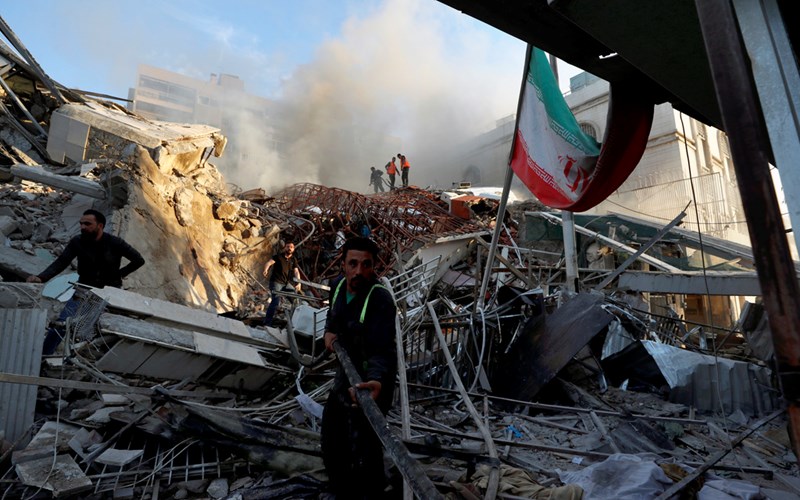Iran launched more than 300 attack drones and missiles against Israel Saturday night local time. Most were intercepted by Israel Defense Forces (IDF) with assistance from U.S., Britain, Jordan and France forces, according to The Times of Israel. An IDF statement on Sunday said the attack included 170 drones, 30 cruise missiles and 120 ballistic missiles.
The attack was expected retaliation for a suspected Israeli strike earlier this month in which 12 people died including two senior Iranian generals, part of the Iranian Revolutionary Guard's elite Quds Force. Iran claims Israel struck a consular building.
President Joe Biden has said he will not support an Israeli counter-offensive against Iran.
Israel will soon reach 200 days of war against Iran-backed Hamas after its rampage of murder and kidnapping against Israeli civilians last Oct. 7.
Distraction before destruction
Dr. David Grantham, a leading Middle East analyst, predicted on American Family Radio Monday that Americans will soon begin feeling the effects of the conflict in the Middle East. "We are inching closer, I'm afraid, to a war of a thousand cuts, if you will, where it's a gradual escalation," he explained.
Grantham is senior fellow at the Center for Secure Free Society and a nationally renowned intelligence professional.
"I think we're going to see more non-military interventions or disruptions such as cyber attacks, attacks against the [power] grid, against water, attempts to disrupt transportation, shipping, economic issues. Then possibly it could escalate to small-scale terror attacks in the homeland again," Grantham told show host Jenna Ellis.
These attacks won't be intended to produce death and destruction but distraction, Grantham said. The goal will be to weaken any U.S. assistance to Israel.
Americans should expect anything "from small issues like certain foods may be unavailable for some time or the price of a certain food may skyrocket because there's an ingredient that they just can't get; maybe gasoline, the price to go through the roof temporarily," Grantham suggested.
And those minor attacks, he said, could become more significant over time.

"If an attack is successful against a small section of the grid, you could see electricity out there for a time. You could see water disruptions," he added. The goal would not necessarily be to poison a water system "but just to disrupt it enough that it requires local services to cut off distribution for a time to ensure that the system is functioning," Grantham said.
Smaller attacks would be a "best course of action" for any foreign adversary looking to sow disruption in the U.S., Grantham said.
Grantham: Expect subtle attacks, then denials, from Iran
Such attacks would have Iran's fingerprints but not its signature, according to the Middle East expert.
"Iran will do its best to distance itself from many of those, but I think we're going to see a gradual escalation because Iran [this weekend] telegraphed what they were going to do. To send drones and missiles from Iran into Israel, it's fairly obvious what was coming, where it was coming from, and how many there were. So, they weren't attempting to hide that.
"If you can create small havoc, relatively speaking, across the United States it forces the United States to preoccupy itself with fixing those things. Meanwhile, foreign adversaries can move in their part of the world while we're distracted having to do that," Grantham said.
Those types of attacks, he explained, would put initial pressure on county and state governments first.
"If there's a terrorist attack, let's say a small-scale terrorist attack, locals are going to be the first ones to respond. They're going to bear the burden of processing the scene, helping victims, etc., etc. If you want to know where your confidence should lie, and if you want to know Where should I go to make sure that we're prepared, go to your local governments, go to your local sheriff, your local police chief, your local mayor," Grantham said.
Any federal response would be much slower in coming, he added.
Another reason for likely small-scale attacks is that Iran's drone-dominant attacks on Israel foretold its current war strategy.
"That tells me that Iran is not interested in an all-out war just yet. They were probably hoping Israel would respond over and above how they responded, giving them further pretext to escalate," Grantham said. "I would prepare the next 12 months for a gradual escalation of COVID-like disruptions."
The last days? Maybe not yet
Iranian attacks on Israel were anticipated, but before the barrage began Joel Rosenberg, the publisher of AllIsraelNews.com, posted an analysis wondering if the times are a fulfilment of biblical prophecy of the world turning against Israel.
Israelis were living in prosperous times last Oct. 6, but on Oct. 7 everything changed, Rosenberg wrote.
Rosenberg posed this question to readers: "Are Israelis just going through a bad patch and our fortunes will brighten again soon? – Or are we beginning to see Bible prophecies unfold in which the entire world turns against Israel and Jewish people in the 'last days?'"
Ryan Helfenbein, vice president of communications at Liberty University, is skeptical that now's the time to look to the skies for Christ's return.

"I am somewhat hopeful and optimistic that this is a rough patch. When those bombardments were coming down over the weekend and you had cruise missiles, you had drones, Israel was not completely alone. Even though there was weak leadership from the United States, you did see there was a carrier group that was moved closer in on Friday to show our support. There were others that were joining in support of Israel, including the Saudis," Helfenbein said Monday on American Family Radio.
"Jesus said in the gospel there will be wars and rumors of wars, and I have to be reminded of that always. So even when we see these types of things – and we have seen them before in the modern state of Israel; we have seen wars and rumors of war – we have to hold fast," he urged.
One other reason for hope, he added, is the people of Iran – not the leadership, but most of its citizens.
"What we're seeing even out of Iran, and I'm talking about the citizens – I'm not talking about the Islamic Republic, I'm not talking about the Ayatollahs – but the citizens within the country who are protesting right now … this regime is under pressure to show strength, and they looked very weak over the weekend, very weak indeed," Helfenbein said.







